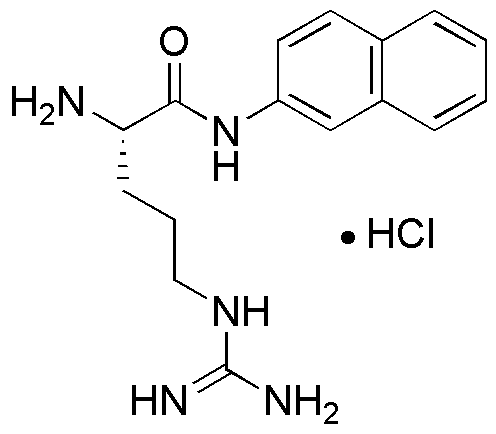L-Arginine b-naphthylamide hydrochloride is widely utilized in research focused on:
- Biochemical Research: This compound serves as a substrate in enzyme assays, particularly for studying nitric oxide synthase activity, which is crucial in cardiovascular research.
- Pharmaceutical Development: It is explored for its potential in drug formulations aimed at enhancing blood flow and improving vascular health, making it valuable in developing treatments for conditions like hypertension.
- Cell Culture Studies: Researchers use it to supplement cell culture media, promoting cell growth and viability, particularly in studies involving endothelial cells.
- Neuroscience Applications: The compound is investigated for its role in neuroprotection and cognitive enhancement, potentially aiding in the development of therapies for neurodegenerative diseases.
- Sports Nutrition: It is included in formulations aimed at improving athletic performance and recovery by enhancing nitric oxide production, which can lead to better blood flow and nutrient delivery to muscles.
Informations générales
Propriétés
Sécurité et réglementation
Applications
L-Arginine b-naphthylamide hydrochloride is widely utilized in research focused on:
- Biochemical Research: This compound serves as a substrate in enzyme assays, particularly for studying nitric oxide synthase activity, which is crucial in cardiovascular research.
- Pharmaceutical Development: It is explored for its potential in drug formulations aimed at enhancing blood flow and improving vascular health, making it valuable in developing treatments for conditions like hypertension.
- Cell Culture Studies: Researchers use it to supplement cell culture media, promoting cell growth and viability, particularly in studies involving endothelial cells.
- Neuroscience Applications: The compound is investigated for its role in neuroprotection and cognitive enhancement, potentially aiding in the development of therapies for neurodegenerative diseases.
- Sports Nutrition: It is included in formulations aimed at improving athletic performance and recovery by enhancing nitric oxide production, which can lead to better blood flow and nutrient delivery to muscles.
Documents
Fiches de données de sécurité (FDS)
La FDS fournit des informations de sécurité complètes sur la manipulation, le stockage et l’élimination du produit.
Spécifications du produit (PS)
Le PS fournit une description complète des propriétés du produit, notamment sa composition chimique, son état physique, sa pureté et les exigences de stockage. Il détaille également les plages de qualité acceptables et les applications prévues du produit.
Certificats d'analyse (COA)
Recherchez des certificats d'analyse (COA) en saisissant le numéro de lot du produit. Les numéros de lot et de lot se trouvent sur l'étiquette d'un produit, après les mots « Lot » ou « Lot de fabrication ».
Numéro de catalogue
Numéro de lot/série
Certificats d'origine (COO)
Ce certificat d'exploitation confirme le pays dans lequel le produit a été fabriqué, et détaille également les matériaux et composants utilisés et s'il est issu de sources naturelles, synthétiques ou autres sources spécifiques. Ce certificat peut être requis pour les douanes, le commerce et la conformité réglementaire.
Numéro de catalogue
Numéro de lot/série
Fiches de données de sécurité (FDS)
La FDS fournit des informations de sécurité complètes sur la manipulation, le stockage et l’élimination du produit.
DownloadSpécifications du produit (PS)
Le PS fournit une description complète des propriétés du produit, notamment sa composition chimique, son état physique, sa pureté et les exigences de stockage. Il détaille également les plages de qualité acceptables et les applications prévues du produit.
DownloadCertificats d'analyse (COA)
Recherchez des certificats d'analyse (COA) en saisissant le numéro de lot du produit. Les numéros de lot et de lot se trouvent sur l'étiquette d'un produit, après les mots « Lot » ou « Lot de fabrication ».
Numéro de catalogue
Numéro de lot/série
Certificats d'origine (COO)
Ce certificat d'exploitation confirme le pays dans lequel le produit a été fabriqué, et détaille également les matériaux et composants utilisés et s'il est issu de sources naturelles, synthétiques ou autres sources spécifiques. Ce certificat peut être requis pour les douanes, le commerce et la conformité réglementaire.


